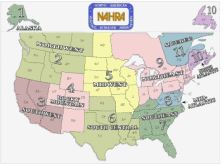NAHRA: www.NAHRA.org
The NAHRA concept is based solely on simulating real hunting situations, both upland hunting and waterfowling. Tests
are designed to simulate a day's hunting a field. Each test must be carefully thought out with a specific goal in mind, based
upon a hunting scenario. It must be realized that some participants may not be experienced hunters; consequently, the judge
shall explain in detail the hunting scenario, the object of each test and the expected performance of the dogs.
NAHRA's purpose in establishing this concept is to discover and reward dogs that can fulfill the hunter's needs in the
field by performing in a manner consistent with the demands of actual hunting conditions. The purpose is not to confront the
dog with trick problems, but rather to test the dog's natural ability and acquired training. Under the NAHRA concept, the
objective is to recover the bird as quickly and efficiently as possible, to create the least amount of disturbance in the
marsh and upland and to give the hunter the maximum amount of time to actually take game. Dogs are placed in four categories
based on ability not age: Beginner, Started, Intermediate and Senior. Dogs do not compete against one another for placements,
but rather their performances are judged individually against a "standard." Thus, the dog should be scored on its
hunting Performance as stated for each category.
NAHRA allows many different breeds to enter hunt
tests and become eligible for titles. All purebred Labrador Retrievers, Chesapeake Bay Retrievers, Golden Retrievers, Curly-Coated
Retrievers, Flat-Coated Retrievers, Irish Water Spaniels, Boykin Spaniels, American Water Spaniels, English Springer Spaniels,
Nova Scotia Duck Tolling Retrievers, Russian Spaniels, Brittany Spaniels, Clumber Spaniels, Cocker Spaniels, English Cocker
Spaniels, Field Spaniels, Sussex Spaniels, Welsh Springer Spaniels and Poodles registered with the American Kennel Club, Canadian
Kennel Club, Boykin Spaniel Society or American Field Dog Stud Book are eligible to enter and participate in Licensed NAHRA
Hunting Retriever Field tests.
Rules & Regulations:
https://www.nahra.org/images/stories/PDF/NAHRARuleBook_01Jan2018.pdf

AKC: www.akc.org
AKC Retriever Hunting Tests were designed to give the dog owner a good, basic hunting dog and provide a place to run
and compete. Here the dog is not competing against the other entries, but against a "standard." This "standard"
was established by AKC as a means of judging good hunting retrievers and is modified periodically as and when needed.
Dogs are judged in three divisions; Junior, Senior, and Master. The Junior dog is judged only on marked
retrieves, no blinds and the dog need not be steady, but may be held. This is generally the beginning level for most people.
Senior is the next step and here the dog in addition to marked retrieves must also be able to deal with relatively easy blind
retrieves, honoring another dog's retrieve, and be steady. Master is the top level and here the dog is required to retrieve
difficult marking situations such as three or more birds down prior to being sent to retrieve and be able to honor another
dog's retrieve. The dog in general must exhibit those qualities which must be expected in a truly finished and experienced
hunting retriever.
All test levels should be designed to simulate, as nearly as possible, true
hunting situations and natural hazards, obstacles, numerous decoys. Hunting equipment and implements should be used to help
with this effort. While at the same time the judges must keep in mind that in a hunting "test," we are testing dogs
not "hunting." This is quite important as everything that happens while hunting does not necessarily make for a
good Hunting Test.
Rules & Regulations: www.akc.org/pdfs/rulebooks/RHTRET.pdf